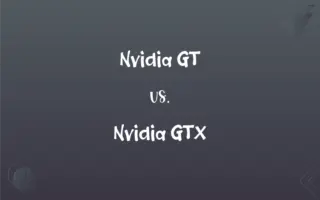MILC vs. DSLR Camera: What's the Difference?
Edited by Aimie Carlson || By Harlon Moss || Published on February 17, 2024
MILC (Mirrorless Interchangeable Lens Camera) lacks a mirror mechanism, enabling compact design; DSLR (Digital Single-Lens Reflex) uses a mirror for an optical viewfinder, typically larger and heavier.

Key Differences
MILC, being mirrorless, is more compact and lighter than a DSLR. The absence of a mirror mechanism in MILCs allows for a smaller body, whereas DSLRs, with their mirror and prism system, are generally bulkier.
MILCs use an electronic viewfinder (EVF) or LCD screen for image composition. DSLRs, however, rely on an optical viewfinder (OVF) using a mirror and prism system, providing a direct optical view through the lens.
MILCs often have faster autofocus systems using on-sensor phase detection, advantageous in video and rapid shooting. DSLRs traditionally used separate autofocus sensors, though newer models are closing this gap.
DSLRs typically offer longer battery life due to the lower power consumption of optical viewfinders. MILCs, with electronic viewfinders and screens, usually consume more power, leading to shorter battery life.
DSLRs, established for longer, have a wider range of available lenses. MILCs are catching up but may have fewer native lens options, although adapters can expand their compatibility.
ADVERTISEMENT
Comparison Chart
Viewfinder
Electronic (EVF) or LCD
Optical (OVF)
Size and Weight
Generally more compact and lighter
Typically larger and heavier
Autofocus System
Fast, often with on-sensor phase detection
Traditional separate AF sensors, now evolving
Battery Life
Shorter due to EVF and screen usage
Longer, owing to OVF efficiency
Lens Availability
Growing, with adapters for more options
Extensive, established range
ADVERTISEMENT
MILC and DSLR Camera Definitions
MILC
MILC technology is newer, integrating more digital features than traditional cameras.
The touchscreen interface on my MILC makes changing settings quick and intuitive.
DSLR Camera
DSLRs have a wide range of interchangeable lenses, suitable for various photography genres.
For wildlife photography, I rely on my DSLR's extensive lens selection to get the perfect shot.
MILC
MILCs often feature faster continuous shooting speeds than DSLRs.
Capturing action shots at the soccer game was easier with my MILC's high burst rate.
DSLR Camera
DSLRs have long battery life, ideal for extended shooting sessions or travel.
On my week-long hiking trip, my DSLR lasted without needing a recharge.
MILC
MILC is a digital camera with interchangeable lenses but no reflex mirror system.
I switched to a MILC for its compact size, making my travel photography more manageable.
DSLR Camera
DSLR cameras often excel in low-light conditions, offering superior noise performance.
My DSLR's low-light capabilities were essential for capturing sharp images at the concert.
MILC
MILC offers advanced video capabilities due to its mirrorless design.
My latest short film was shot entirely on a MILC, utilizing its excellent video autofocus.
DSLR Camera
DSLR cameras offer a tactile shooting experience with numerous physical controls.
I enjoy the hands-on control of my DSLR, especially while adjusting manual settings.
MILC
MILCs provide real-time exposure and depth of field preview on their screens or EVFs.
Using a MILC helped me nail the exposure for my sunset photos on the first try.
DSLR Camera
DSLR is a digital camera using a mirror to direct light from the lens to an optical viewfinder.
I prefer using my DSLR for its clear and lag-free optical viewfinder.
FAQs
What is a MILC?
A MILC is a compact, mirrorless digital camera with interchangeable lenses.
Can MILCs use DSLR lenses?
Yes, with appropriate adapters, MILCs can use DSLR lenses.
What does DSLR stand for?
DSLR stands for Digital Single-Lens Reflex, referring to its mirror and prism system.
Is a MILC good for action photography?
Yes, MILCs can be excellent for action photography due to their fast continuous shooting speeds.
Do MILCs have a shorter battery life?
Yes, generally, due to their reliance on electronic viewfinders and screens.
Are MILCs better for video?
MILCs often have superior video capabilities due to faster autofocus and advanced features.
Do DSLRs offer more lens options?
Traditionally, yes. DSLRs have a more extensive range of lenses.
Can I preview exposure on a MILC?
Yes, MILCs offer real-time exposure and depth of field preview.
Are MILCs lighter than DSLRs?
Yes, MILCs are generally lighter due to their mirrorless design.
Do DSLRs have better battery life?
Yes, DSLRs typically have longer battery life compared to MILCs.
Do DSLRs have an optical viewfinder?
Yes, DSLRs use an optical viewfinder through a mirror and prism system.
Can DSLRs shoot silently?
Unlike MILCs, DSLRs typically make some noise due to their mirror mechanism.
Are DSLRs more durable?
DSLRs are generally built robustly, but many MILCs also offer solid construction.
Are MILCs more expensive?
The price varies; some MILCs are more expensive, while others are competitively priced.
Is autofocus faster on a MILC?
MILCs often have faster and more accurate autofocus, especially for video.
Are DSLRs better in low light?
DSLRs often perform well in low light, though MILCs are rapidly catching up.
Can MILCs be used professionally?
Absolutely, many professionals use MILCs for their compactness and advanced features.
Is a DSLR better for beginners?
Both DSLRs and MILCs are suitable for beginners, depending on their specific needs and preferences.
Do DSLRs offer live view?
Yes, most modern DSLRs provide a live view mode using the rear LCD screen.
Do DSLRs handle better for manual controls?
DSLRs typically offer more physical controls, preferred by some for manual adjustments.
About Author
Written by
Harlon MossHarlon is a seasoned quality moderator and accomplished content writer for Difference Wiki. An alumnus of the prestigious University of California, he earned his degree in Computer Science. Leveraging his academic background, Harlon brings a meticulous and informed perspective to his work, ensuring content accuracy and excellence.
Edited by
Aimie CarlsonAimie Carlson, holding a master's degree in English literature, is a fervent English language enthusiast. She lends her writing talents to Difference Wiki, a prominent website that specializes in comparisons, offering readers insightful analyses that both captivate and inform.






































































